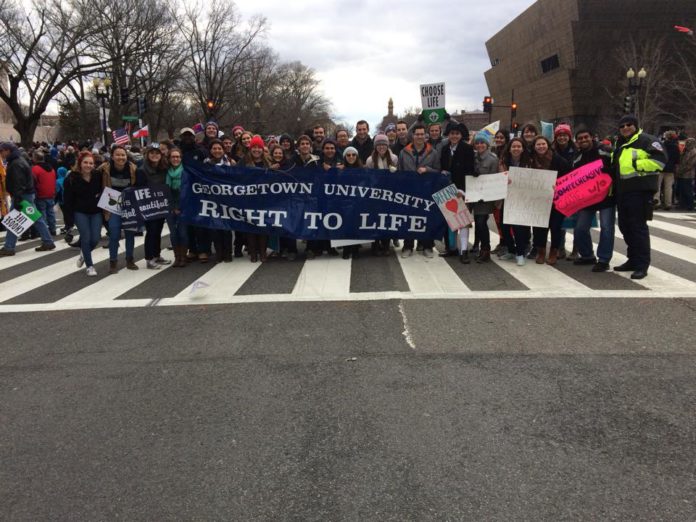![]()
The current Editorial Board of The Georgetown Review (presiding since October 27, 2019) supports full access to past articles published under different Editorial Boards, but does not necessarily endorse their content.
During the last week of March, H*yas for Choice (HFC) held its annual Choice Week. The following week, Georgetown Right to Life (RTL) hosted Life Week. Both are popular events on campus, but they received unmistakably different coverage from The Hoya, Georgetown’s student newspaper.
The Hoya‘s bias in covering Georgetown Right to Life and its events was immediately apparent in the use of the term “anti-abortion.” While the term is technically not inaccurate (RTL is against abortion), there are two major problems with it.
First, “anti” comes with a negative connotation. The connotation of “anti-abortion” is similar to that of “anti-woman” or “anti-feminist.”
Amelia Irvine, president of Georgetown Right to Life, described the term as one that “implicitly favors pro-choice people.”
This negative term is favored by writers at The Hoya. In the paper’s Choice Week article, H*yas for Choice was never referred to using terms that carry a negative connotation.
Second, “anti-abortion” only scratches the surface of the pro-life movement. It does not take into account RTL’s opposition to the death penalty, euthanasia and its focus on intersectionality. The term limits pro-life interests to only the act of abortion and ignores the fact that RTL actively advocates for better resources for mothers—both during and after pregnancy—including support, housing, childcare and facilities.
According to Mylan Metzger, vice president of Georgetown Right to Life, The Hoya has been insistent on the use of the inaccurate and offensive term. In her recent opinion piece published in The Hoya, Metzger noted that her article had been edited to include the term pro-life in quotation marks. Metzger says that she was not made aware of the edits until she saw her published piece.
Yet, The Hoya‘s unbalanced coverage of Georgetown Right to Life goes beyond the use of the term “anti-abortion.” In news articles, the organization is constantly framed in the context of H*yas for Choice. This is not true when the roles are reversed.
While The Hoya upholds an imperative to include sources and quotes from H*yas for Choice in its articles, it does not apply the same standard to pro-life opinions.
In the paper’s recent piece on Life Week, H*yas for Choice was quoted. However, in the Choice Week piece, there was no mention of RTL’s views.
In this case, H*yas for Choice weighed in on RTL’s presentation of the documentary film “HUSH” with especially strong language.
“Although all of Georgetown Right to Life’s Life Week events are appalling, the screening of the documentary, HUSH, is especially concerning in its direct opposition to proven medical science and facts,” the statement read.
When Right to Life President Amelia Irvine questioned the author about RTL not being quoted in the article, the author explained that she needed to meet a quick deadline. The author chose to go ahead with publishing, despite The Hoya‘s editorial policy that allows deadline extensions if other sources are deemed necessary.
I don’t buy that excuse.
There is no problem with including HFC’s comments in articles. That’s what a journalist should do. The problem is that the same courtesy is not always extended to RTL.
But this isn’t the first time that RTL has been covered in a way that favors HFC.
Last February, The Hoya published an article covering HFC’s condom delivery service. Again, RTL President Amelia Irvine emailed The Hoya to share a surprising truth: RTL has no official stance on contraception.
Yet, Irvine’s comments were not mentioned in the piece. Instead, the author included a quote from Hunter Estes, who was introduced in the piece as the Grand Knight of Georgetown’s Knights of Columbus. The author made sure to include that Estes was a member of Georgetown Right to Life, but not any of his other club memberships. The nod to RTL was a misleading detail, suggesting that he was speaking on the behalf of the club.
For his part, Estes described his experience with The Hoya as fair but sometimes challenging.
“When they do talk with us, they are fair and I think fairly represent what we said,” Estes noted. “However, I believe the constraining of our position to anti-abortion is wrong because the pro-life issue covers so much more than just abortion.”
Let me be clear: there is nothing wrong with a publication having a certain bias one way or another—so long as they own it and publicly endorse it in their opinion pages. There is nothing wrong with reporters having opinions on the topics they cover—so long as they keep those opinions out of their work.
And if they can’t, then label the article an op-ed.
If The Hoya wants to be Georgetown’s “paper of record,” then it needs to cover Georgetown Right to Life with the same courtesy it extends to H*yas for Choice.












